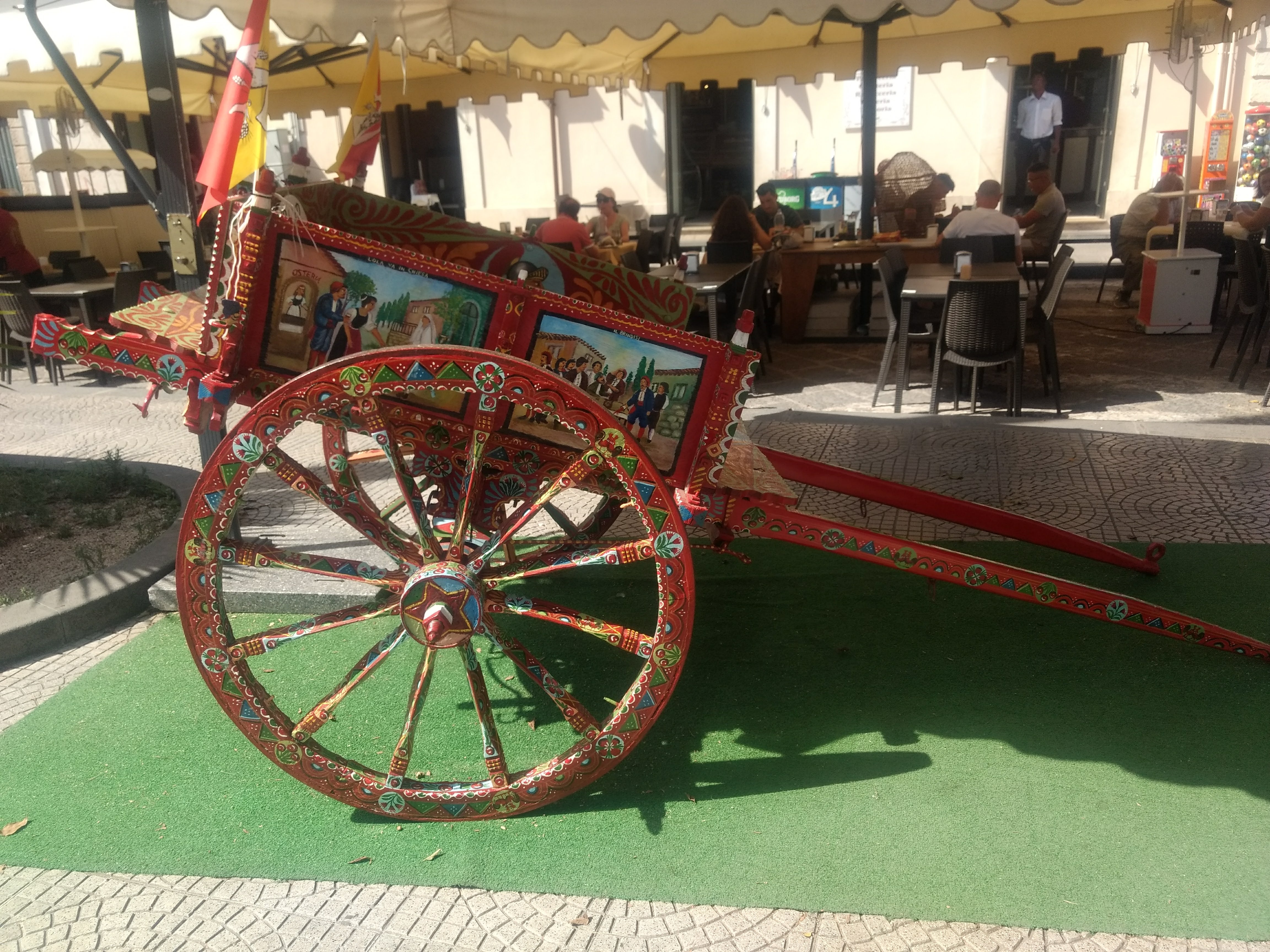
In the morning we took the ferry across the Strait of Messina to Sicily. It was a Sunday, the first of July. The ferry ride was quick and uneventful. Buying tickets and boarding was not so hard to figure out, and the whole thing unfolded as expected. The ferry cost €38 for the car and three passengers.
A note that I cannot resist: Long-time readers know that I am a fan of train travel. The island of Sicily has train service to and from the mainland. This works via a very long, skinny train-ferry. I'm not making this up. Google it and be amazed. I wish we could have taken that or at least seen it, but the car ferry schedule is far from the train ferry schedule, so there was nothing to see of that ferry from our ferry.
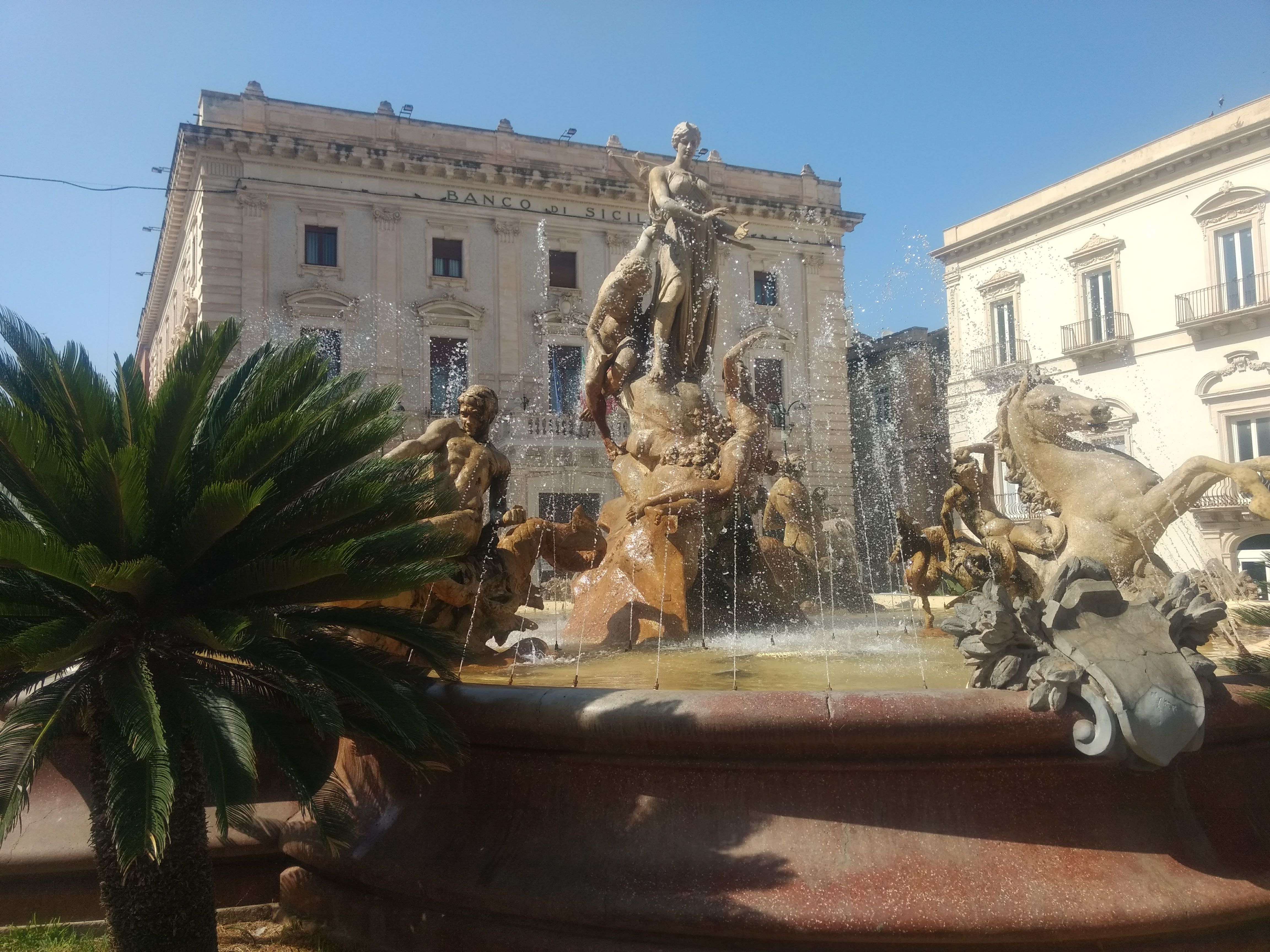
Then we drove a little over two hours down the east coast of Sicily from the chaos of Messina past Taormina and Catania (and Mount Etna on our right) and all the way down to the ancient city of Siracusa.
Siracusa was already an ancient and powerful city when the Romans arrived. It was founded around 735BC by Corinthian Greeks, long before the height of Athens and not long after Hellenic culture emerged from the dark ages of the Bronze Age Collapse that destroyed Mycenae and Minoa. Siracusa was home to the brilliant mathematician and inventor Archimedes, among other luminaries, and it had and still has a great amphitheater built 2700 years ago.
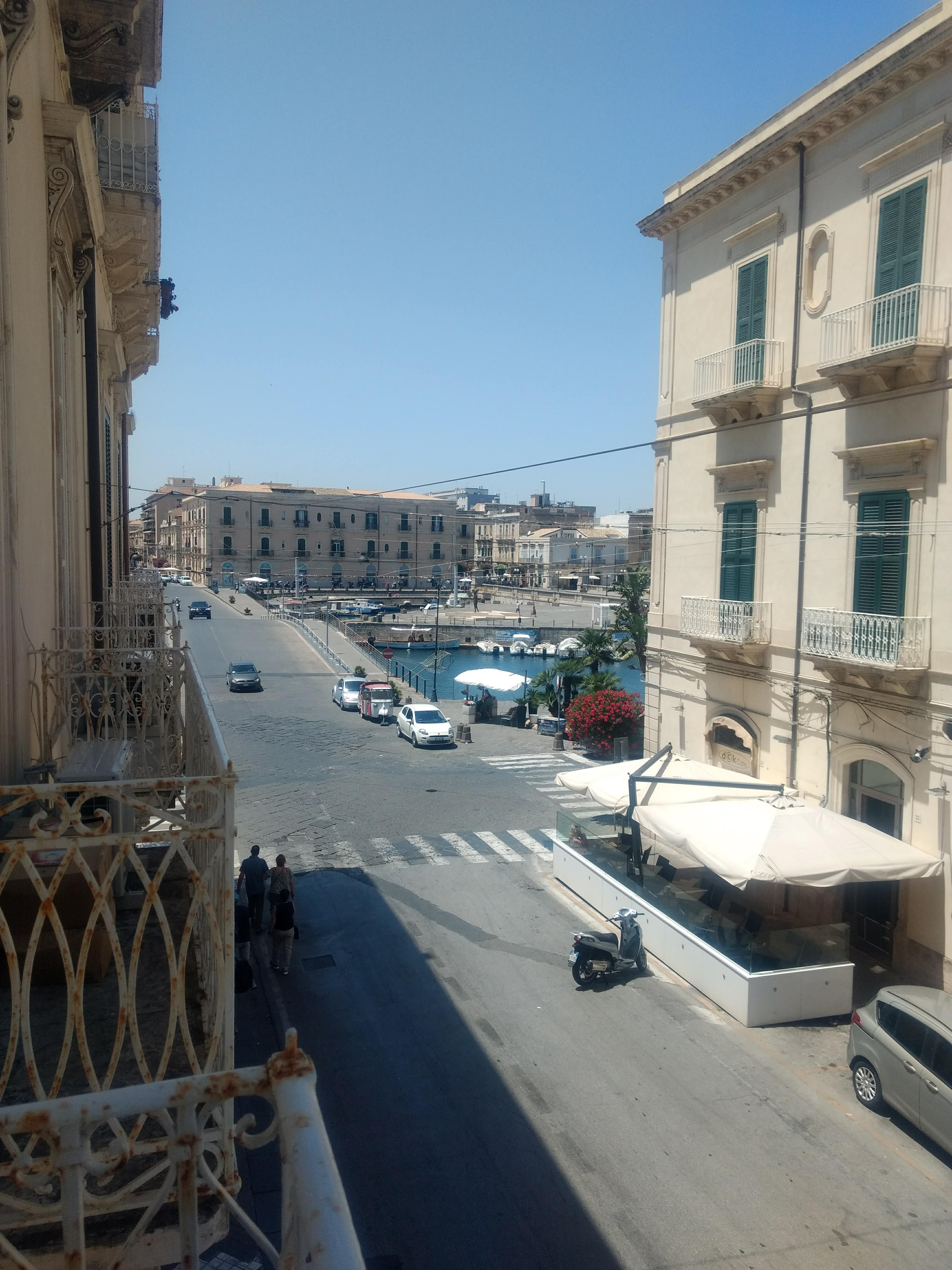
The congested old heart of Siracusa is Ortygia, a large island in the harbor on which sat the old city.
We stayed at the B&B Il Centro Storico, just past the end of the bridge to Ortygia so it was comparatively easy to get to and to escape from with the car. On Ortygia and in Syracuse we travelled exclusively by foot and taxi.
The B&B was quite romantic, in the old-school sense. Old architecture, with soaring ceilings and tall windows looking out over the town and a bit of the canal that separates Ortygia from mainland Siracusa. Fortunately it had an good air conditioner (Sicily is hot in July!) and a good elevator.
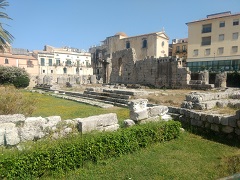
The location was great. One block south was a park that contained the ruins of the ancient Greek temple to Apollo! On the adjacent street were the two excellent restaurants at which we dines, and downstairs was a spice merchant. And three blocks east was the fabulous farmers/fishers market, about which more tomorrow.
Salvo is the owner of the B&B. He's a real promoter, well-connected and with very good English - these things made our lives much easier. On his recommendation we had lunch at Porto Grande, just half a block away. It was excellent, if not entirely what we expected. Of course, nothing in Siracusa was what we expected...
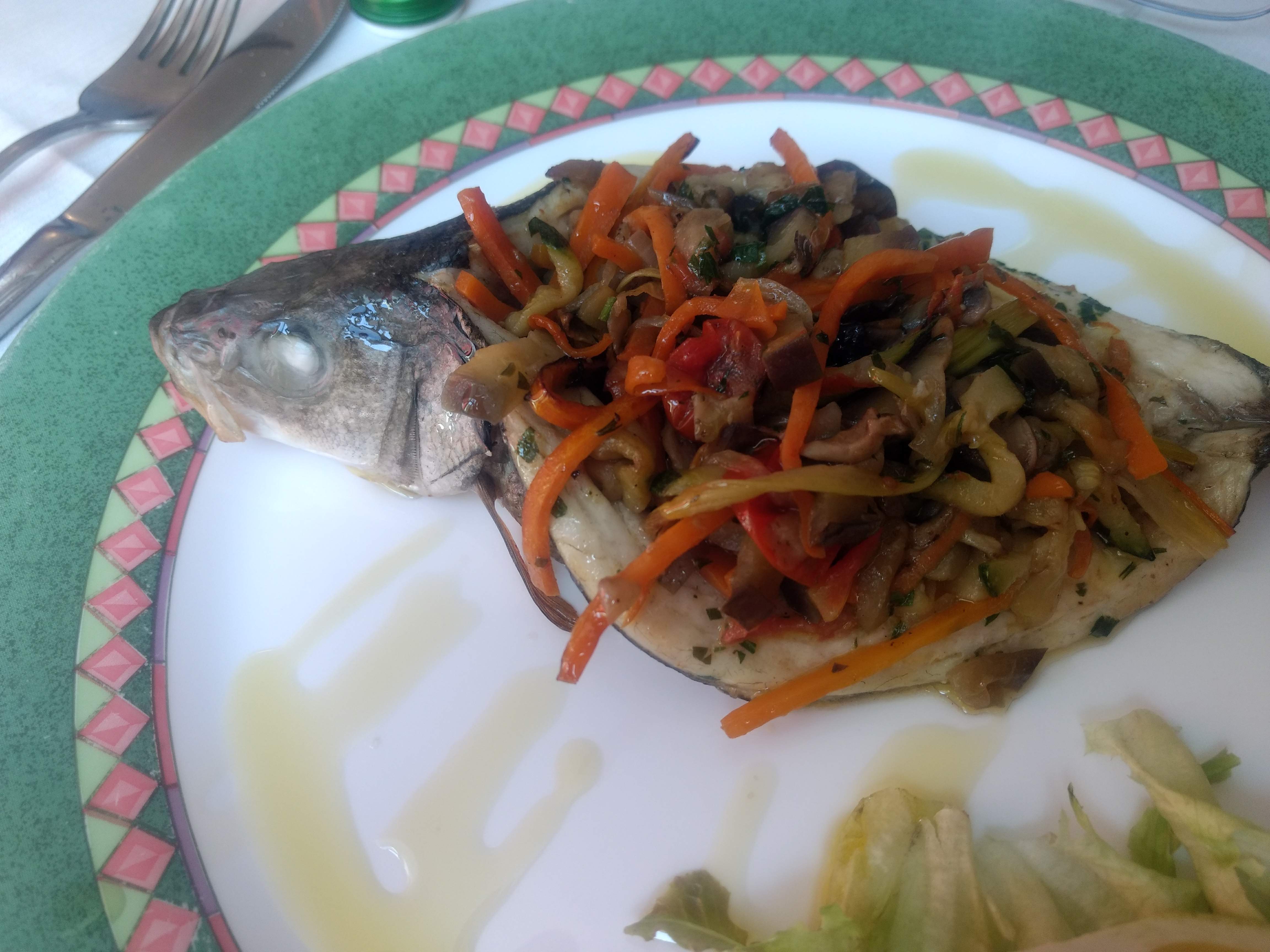
I don't normally leave to chance something as important as our only meal in this ancient corner of Sicily, and indeed I already knew where I wanted to eat and it wasn't Porto Grande. But La Vela was not yet open and I expected to get there after the evening's entertainment.
For lunch, Lorna got best-of-show with the spigoli ripieni alle verdure, or sea bass stuffed with julienned vegetables. This was accompanied by a bottle of Nero d'Avola that we shared. Melissa got a very good rigatoni with ricotta salata and black oil-cured olives, a very Sicilian dish. I got homemade pasta with assorted little fishy things in it. We'd had an excellent Sicilian meal and we hadn't yet gotten to my chosen eatery.
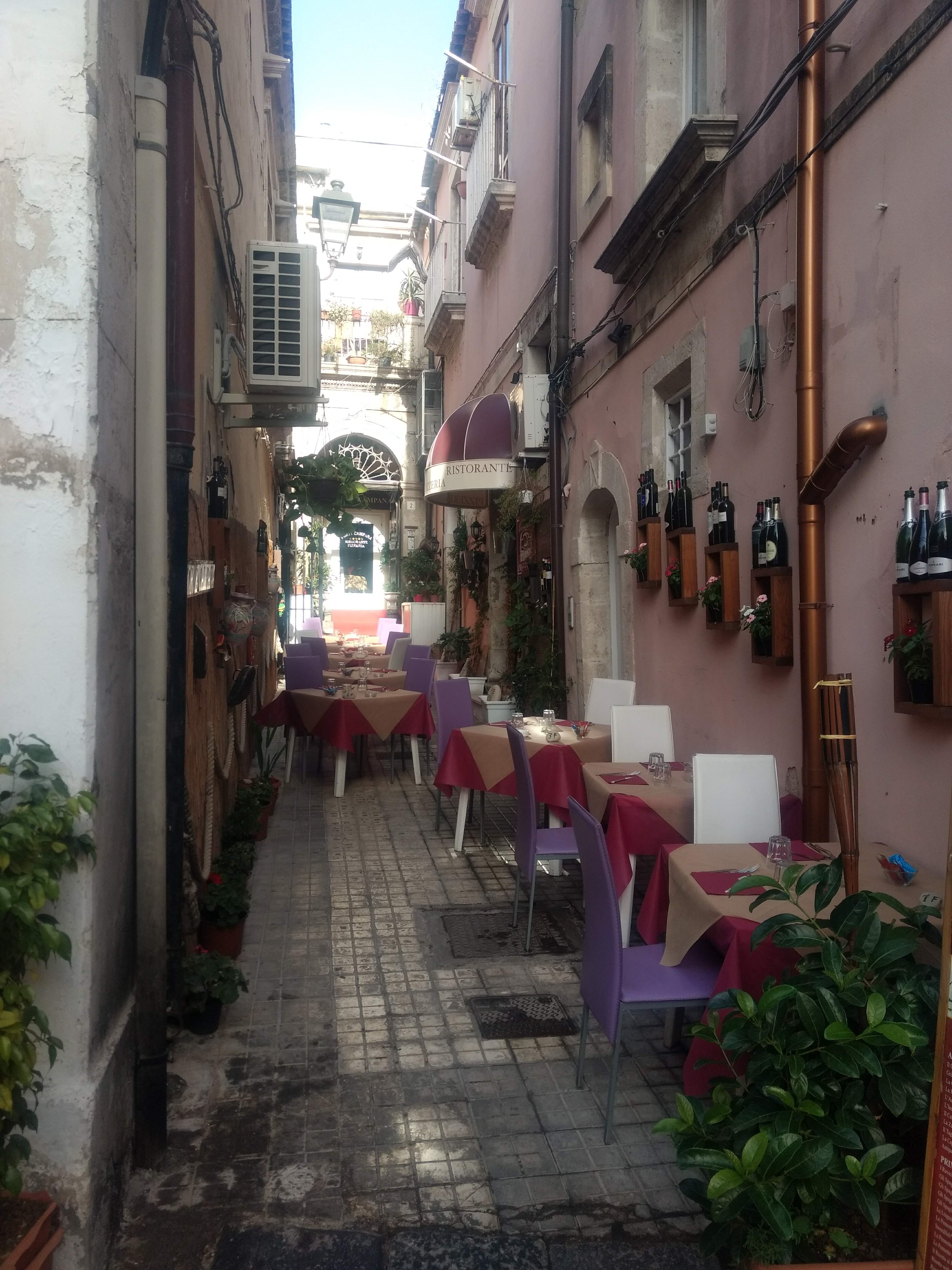
I'm going to say here that I loved Siracusa, but Lorna and Melissa did not. On the surface, most of my readers would agree with them: there were more shops selling t-shirts and tchotchkes and fewer with fine local crafts, etc. It's hard to put my finger on it, but I hope this article conveys my enthusiasm.
So after lunch, we explored Ortygia as best we could for a Sunday. A Sunday that was mighty hot! People were going in to the ATM booths just to cool down. There was a breeze from the harbor, so we explored a lot of the waterfront on both sides of the island.
But the best shopping was in the middle, and the air-conditioned ATM was also, so we cut through there. In the end, I bought a nice serving plate (Southeastern Sicily is known for pottery) and I bought a very fine, very handsome black Italian leather briefcase to replace my old nylon one that had broken that morning - and which I had used every working day since grad school at WPI in 1995!
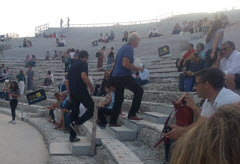
The most important time-point of the day for me was the start of a play at the old amphitheater. Months previously I had bought front-row-center seats to I Cavallieri by Aristophanes as part of the classical theater festival. If Siracusa had been a shoppers' paradise on a Sunday evening, then I would have gladly let the ladies continue shopping, but no-way-no-how was I going to miss the opportunity to see a play from the golden age of Greek drama in a classic Greek theater - that it was written for! Aristophanes won the classical Greek equivalent of a Tony award for The Knights in 734 BC, and now I can see why.
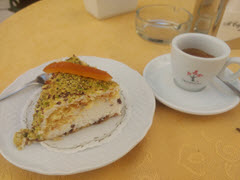
We had to get to the amphitheater on time, but beyond that, we had to get coffee and pastry at Alfio Neri near the Teatro Greco, the number one place in all of Siracusa for such things according to TripAdvisor. Fortunately our well-connected host Salvo knew a cab driver hungry for a fare, and we were escorted to the pasticceria at high speed, with plenty of running commentary on American and Italian politics (more alike than not) and on Italian football.
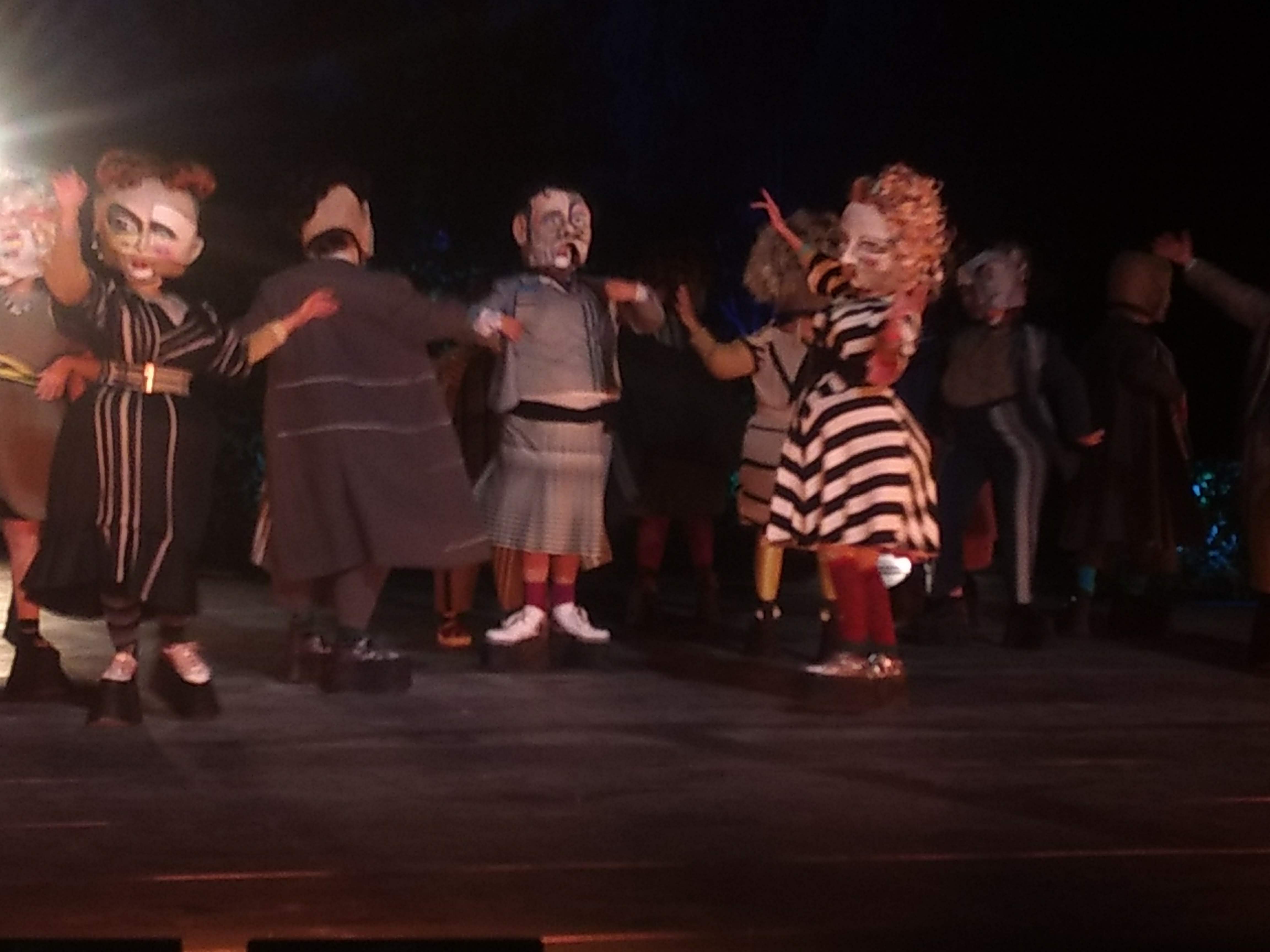
The show was amazing! I Cavallieri is Italian for The Knights. Aristophanes wrote in Classical Greek but they produce the play in Italian at the Teatro Greco.They don't do subtitles, so you really want to know what's going on before the curtain goes up.
Aha! There's no curtain. There's no Act I Scene 2 either. Those advancements in the playwrights' art were centuries away from Aristophanes. The play is from the dawn of drama, but it's still relevant today. The Knights is about the perils of Democracy, in wich a fickle and inattentive public can select a fool for a leader, and when they get disguted, replace him with another fool.
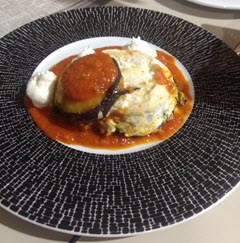
After the show we returned to Ortygia for a late dinner at La Vela, where I had been hoping to dine. They have an excellent reputation for locavore food expertly prepared and impeccably fresh. The wine list is local, too.
We had a wonderful eggplant appetizer, then we shared a platter of perfect grilled vegetables, Melissa had the Sicilian classic Pasta Alla Norma, Lorna had sea bream and I had a spatula steak (spatula is a large local fish similar to a swordfish).
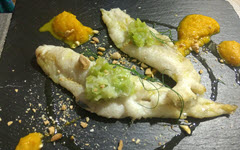
We drank an unusual dry Malvasia wine with it, on the recommendation of our host. The service was knowledgeable and attentive without being intrusive. It was an excellent dinner in every way.
We were too full and tired to consider dessert, so we retired to sleep for the very busy days to come.
